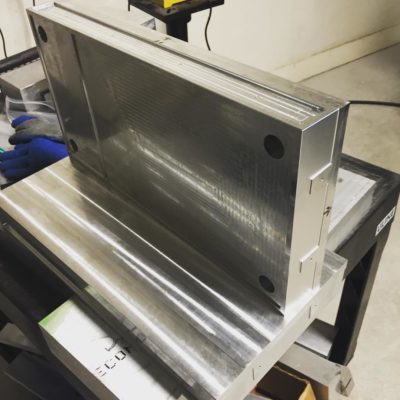Precision Machining: 5 Exotic Materials We Love Working With
Did you know KAD provides precision machining services for exotic materials?
We love working with less common materials and are experts at machining anything from brass and copper to wood. (Throwback to this memorable heirloom project.)
If you’re considering exotic metals for your next prototype machining project, here’s what you need to know about magnesium, tungsten, titanium, Hastelloy®, and Inconel.
5 Exotic Materials KAD Expertly Machines
1. Magnesium
Magnesium is a cost-effective metal that boasts exceptional machinability and a high strength-to-weight ratio—in fact, it’s the lightest structural metal around.
Magnesium machining is similar to aluminum machining due to the materials’ similar properties. The major difference? Magnesium is highly flammable!
Sparks can fly when magnesium comes into contact with even a minuscule amount of steel, melting a machine in under a minute. As a result, special skills and attention are required to machine this material safely.
There are two groups of magnesium alloys: cast alloys and wrought alloys. Aluminum, manganese, and zinc are the most commonly found metals in both groups. Magnesium alloys are often used for aerospace parts, racing applications for automobiles, medical devices, and consumer goods.
2. Tungsten
Tungsten is a popular choice for manufacturing tooling due to its high density. However, it’s not strong in shear. With a low tensile strength, it’s rigid and can shatter easily. Still, tungsten is best used in applications that require very high strength—think counterweights and ballasts. It’s also suitable for work with electrodes.
Tungsten is prone to work hardening and requires special tooling to machine. Common manufacturing approaches include grinding or machining with diamond-coated tooling.
3. Titanium
Found in the earth’s crust, titanium gets its name from the Titans of Greek mythology, known for their super-human strength. Titanium is lightweight, strong, and possesses high heat resistance, with a melting point of 3,000+ degrees Fahrenheit. It’s non-toxic and quite resistant to minerals, acids, and chlorides.
Strong for its weight, titanium is a popular choice for the entire aerospace industry and for high-performance vehicles. It’s also used in consumer goods and other visible components for cosmetic purposes. For example, a headset that secures handlebars on a bicycle frame may be machined from titanium, as it’s strong, lightweight, and can take color through heat treatments or anodization.
Titanium is also used in medical applications—implants, cages for spinal screws, and components that need to be placed in the body are all often made from titanium, as are medical devices for test pallets.
Like tungsten, titanium is prone to work hardening, so it’s best to work with a skilled machinist when choosing titanium for your precision machining projects.
4. Hastelloy
Hastelloy is a nickel and iron alloy; its high nickel content makes it exceptionally strong. This exotic is also extremely corrosion-resistant and can withstand high temperatures.
Hastelloy parts are often found in the body of a spacecraft, as the material’s properties make it a great candidate for aerospace applications.
Hastelloy is also appropriately named because it can be a hassle to machine. Work hardening (you guessed it!) is a big concern, so it’s important to keep the material from getting too hot during the precision machining process.
5. Inconel
Inconel, a registered trademark of Special Metals, is a costly material that consists of 20+ metal alloys. Inconel is very hard but lightweight and resistant to oxidation and high temperatures. Capable of withstanding extreme environments, it’s an excellent choice for aerospace parts.
Because Inconel is such a hard and durable metal, it can be challenging to machine. Inconel can break standard tooling, and it work hardens quickly, so be sure to work with a seasoned expert for your Inconel machining projects.
4 Considerations for Exotic Materials
Exotic materials are used in almost every industry, but they’re especially prevalent in industries that benefit from their high-strength, wear-resistant, and lightweight properties.
Here are four factors clients in any industry should consider before choosing exotic materials:
1. Tooling costs
Exotic materials are often associated with high tooling costs. Tools can wear down quickly because of the strength of these metals. Additionally, shops might need to invest in a specialized or more advanced tool to cut through the material.
2. Machine time
Machinists must move slowly and carefully when cutting through exotic materials to mitigate work hardening issues, which can extend machining time.
3. Material costs
Exotic materials are usually more expensive than your standard steel and aluminum. Our clients tend to order prototype models in less costly materials and save the exotic materials for the low-volume production run unless they require a fully functioning prototype.
4. Work hardening
As you’ve gathered by now, most of these exotic materials are at risk of work hardening. Also called “strain hardening” in metallurgy, work hardening occurs when a metal’s hardness is increased (intentionally or accidentally) through manufacturing processes. Once a material becomes hardened, there’s no way to course-correct and reduce the hardness.
Bring Your Exotic Materials Projects to KAD
As a prototype machining shop focused on creating solutions for our clients, we are equipped to machine prototype models or low-volume production runs using exotic materials. We have the specialized tooling required and even have the supplier network to source small quantities of these materials.
Our team has the Design for Manufacturing (DFM) knowledge to think critically about your project and will always work to make your parts as cost-effectively as possible. Let’s work together the next time you need exotic materials: Request a quote to get started today.



